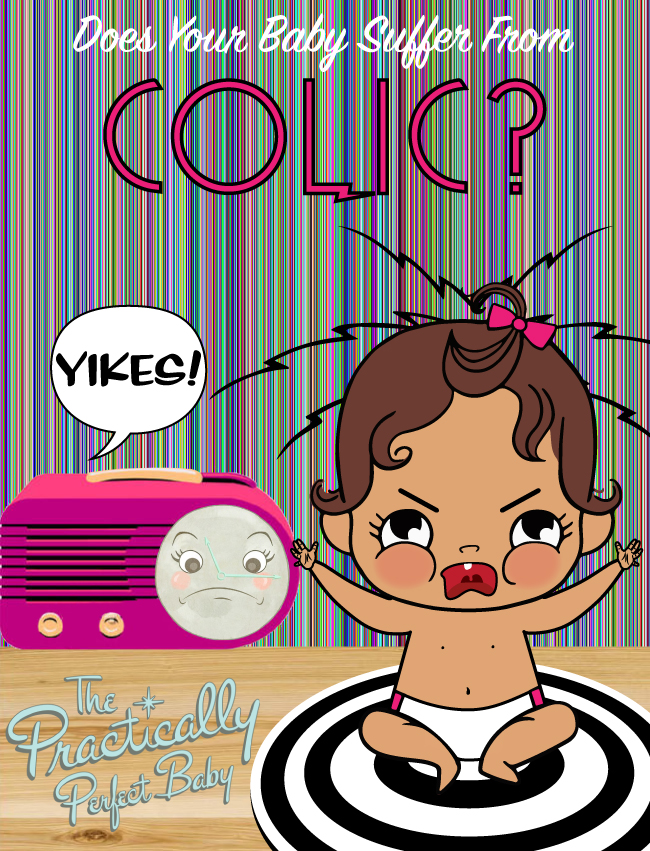Colic Signs, Remedies, and Why Our “Colic Schedule” Really Helps!
Is your baby’s crying “radioactive?” Do you suspect it may be colic? We sincerely hope that’s not the case for your baby because colic really sucks! But first know that many a baby’s cries present like colic when in fact it’s because of another reason (think growth spurts or gas!) and we hope your baby falls into one of the OTHER categories. But hey…colic happens. And when it does, it’s not only super important to remember that it’s NOT your fault if your baby has developed colic; it’s also really important to remind yourselves that IT WILL EVENTUALLY END no matter what you do (or don’t do) about it (it typically only lasts until your baby is 3 months old). But while your poor baby is suffering from colic, your new little family truly suffers too and we want to make sure you ALL get the most help you can to survive it.
COLIC SIGNS
The “Rule of 3’s:”
A good first indicator is to see if your baby’s crying is in sync with the “Rule of 3’s.” It means your baby might very well be suffering from colic if she cries for at least: 3 hours a day; 3 days a week; and for 3 weeks in a row.
But there are other signs associated with colic that may help you diagnose it in your baby:
– Your baby seems irritable nearly all the time, day and night
– Her cries are piercing and she is mostly inconsolable
– She shows signs of tummy pain
– She folds her legs and/or flails her arms
– She passes gas excessively
– She spits up excessively
– She cries spontaneously and frequently jolts from a sound sleep by crying
COLIC REMEDIES
What can you do right now if you suspect your baby suffers from Colic?
* Consult your baby’s pediatrician to rule out other medical reasons for excessive crying and/or spitting up. (See our Why is My Baby Crying?!? post) And also ask which medications might be helpful to block acid production. If you end up giving your baby medications, ask your doctor about the possible side effects because some medications may cause stomach cramps.
* If you’re breastfeeding, consider eliminating ‘gassy’ vegetables, spicy foods, dairy products, caffeine, and/or alcohol. If you have an oversupply of breast milk your baby may not be able to keep up with the flow. This may cause excessive air to be swallowed, resulting in more gas and this only exacerbates her colic. Try reclining or lying down while feeding her to allow gravity to slow the force of the letdown. You may also try expressing some milk first to control the letdown.
* If you’re formula feeding, consider using a curved or vented bottle or one with a collapsible bag inside, to reduce the amount of air your baby is swallowing. (Try this one: Playtex VentAire 6-Ounce Wide Bottle)
* Give your baby a pacifier, especially after a feeding, to bring her extra comfort and help to relax her. (See our Pacifiers post)
* Burp your baby frequently. (See our Burping Basics post)
* After feeding, lay your baby across your knees, tummy-down, and gently massage her back to help relieve her pain.
* Use the “Colic Hold” or the “Tiger in the Tree” technique!
* Swaddle your baby during her feedings and don’t stop swaddling her for her naps and night-time stretches. (See our Swaddling post)
* Feed her in a less distracting environment like her nursery, if you aren’t already, and ideally not in front of the television.
* Turn up the volume on your baby’s sound machine in her nursery. (See our Sound Machine post)
* Make sure you’re holding your baby at at least a 30-degree angle (and never horizontally) when feeding her.
* Consider propping your baby in an upright position, after each feeding, for 30 minutes. You may also want to try elevating her crib mattress slightly, using a sleep wedge under her crib sheet.
* Keep her environment as calm and as quiet as is possible. When your baby doesn’t suffer from colic, we beleive it’s important to keep your normal sound level consistent in your home to maintain normalcy and aide in sleep-training…but that point’s moot when you’re dealing with a colicky baby. This is the time to help her get every minute of shut-eye she can. So shut up the dog, put that awful “Shhh! Baby Sleeping!” sign on your front door, you get it…do what you gotta do for the time period that your baby’s suffering from this painful ailment. Take heart that you can and will get back to our normal PPB parenting techniques when it’s all over! (See our Crib Essentials and Nursery Organization Must-Haves posts)
WHY SCHEDULING HELPS YOUR COLICKY BABY
We also think the BEST thing you can do for your baby is to begin a “Colic Schedule” because she needs to know she can depend on routine now more than ever!
HERE’S HOW:
1. Try our “Colic Schedule.” This means going back to the beginning by feeding her on our Birth-3 Weeks, Option B Schedule — no matter her current age in weeks. This will help ease her colic because she will not be taking in as much food at each feeding — only 2-3 ounces. A fuller tummy places more pressure on her stomach, worsening her colic. So the fewer ounces she receives the more frequently, the less full her little belly will get. Use it until you see real signs that she’s starting to outgrow colic. And THEN start transitioning her to each next schedule, 2 weeks at a time, until she’s caught up to the age-appropriate schedule.
2. Still be flexible within the new schedule. Our schedules are meant to be flexible, no matter the baby. And yes, you don’t have a textbook baby to manage, but establishing and maintaining the schedule will help manage your baby’s colic and help her sleep better. The better sleep she gets, the better able she’ll be to handle her colic. The basic principles of our schedules remain the same for a baby with colic — including the feed – then play – then nap cycle. But you can and should adjust for colicky meltdowns and learn to catch her back up to her colic schedule as quickly as you can. Sleep can be nearly impossible when your baby is regularly waking up screaming 45-minutes into her nap times. But the alternative (no schedule and no chance to self-soothe/sleep train) only leads to an overly dependent, miserable, confused, AND colicky baby. Remember to still utilize our 15-Minute Rule! And don’t force her feeding routine beyond what she is capable of… meaning: if your baby is crying during her feeding, it is better to stop, calm, soothe, and relax your baby and then continue. And this is the one and only time when we think “wearing your baby” (slinging your baby to your chest) is actually a really good idea for calming her down. Just don’t do it for longer than 15-20 minutes!
3. Try to be extra patient with her progress. Remember to take it one day at a time, focusing on your long term scheduling goals. Some days will go well and other days, not so well. Parenting in general is a process; parenting a baby afflicted with colic is a trial! So while it may take many more weeks to stabilize your baby’s routine and have her sleeping through the night, you can and will get there.
COPING AS NEW PARENTS OF A BABY WITH COLIC
An inconsolable baby becomes an enormous worry for a new parent. It’s enough to make you cry. But when you’re in the thick of it, try your best to remember not to take it personally. Just because your baby rejects your attempts to console her or seems angry with you, remember she’s still too young to comprehend the concept of blame. Remember too, colic has nothing to do with your parenting skills and everything to do with your baby being uncomfortable or in pain.
You are not alone. So, share baby care responsibilities with your partner, have a friend or relative take over for you once in a while so you can take a break, and find others that know what you’re going through by contacting a local support group or getting in touch with a family counselor.
Of course, if you find yourself becoming angry or overly frustrated with your baby (and who wouldn’t?), take a deep breath and gently lay her in her crib. Then call your partner, a friend, or a relative to come and stay with your baby while you calm down. If there’s no one to call, call a parenting crisis hotline — they’re trained to know how to help you through these times.
Related Posts: Why is My Baby Crying?!?, PPB Schedules: Birth-3 Weeks, Option B, Burping Basics, Starting Solids Successfully, Formula Feeding, Combination-Method Feeding, Breastfeeding, The Feeding Dilemma, Why Use PPB Schedules?, Overstimulated Babies, Overtired Babies, Baby Growth Spurts, First 3 Weeks: Are You Ready?, Baby Blueprint: First Year, Baby Nightcap, Crying Facts, 15-Minute Rule, Swaddling, When to Stop Swaddling














